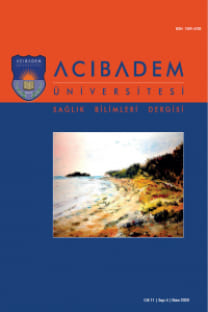Sağlık Bilimlerinde Eğitim Alan Doktora Öğrencilerinin Problem Çözme Becerileri
Problem-Solving Skills of Doct Orate Students In Health Sciences
___
Günüşen N, Üstün B. Hemşirelik Öğrencilerinin Problem Çözme Beceri Düzeyleri İle Kontrol Odağı Arasındaki İlişki. DEUHYO ED 2011;4:72–7.Durmaz Ş, Kaçar Z, Can S, Koca R, Yeşilova D, Tortumluoğlu G. Çanakkale Sağlık Yüksekokulu Öğrencilerinin Problem Çözme Becerileri ve Etkileyen Bazı Faktörler. J Anat Nurs Health Sci 2007;10:4.
Yıldırım B, Özkahraman Ş. Hemşirelikte Problem Çözme. SDÜ Sağlık Bilim Enst Derg 2011;2:155–60. Erişim: https://dergipark.org.tr/ download/article-file/195940
Koç Z, Koyuncu S, Sağlam Z. The Level of Problem-Solving Skills of Health College Nursing and Midwifery Students and Affecting Factors. HEAD 2015;12:41–50. [CrossRef]
Sözer MA, Aksan N. The Relationships Among Epistemological Beliefs and Problem Solving Skills of University Students. Ahi Evran Univ 2007;8:31–50.
Bell AC, Zurilla TJ. Problem-solving therapy for depression: A meta- analysis. Clin Psychol Rev 2009;29:348–53. [CrossRef]
Kantek F, Kartal H. A Meta Analysis: The Problem Solving Skills of Nursing and Other Bachelor Students. J Educ Instruc Stud World 2016;6:121–8. Erişim: http://www.wjeis.org/FileUpload/ds217232/ File/17..filiz_kantek.pdf
Elkin N, Karadağlı F. Araştırma Makalesi Üniversite Öğrencilerinin Problem Çözme Becerilerinin Değerlendirilmesi. Adıyaman Üniv Sağlık Bilim Derg 2015;1:11–8. Erişim: https://dergipark.org.tr/ download/article-file/207459
Dündar S. Üniversite Öğrencilerinin Kişilik Özellikleri ile Problem Çözme Becerileri arasındaki İlişkinin İncelenmesi. Dokuz Eylül Üniv İktisadi ve İdari Bilim Fak Derg 2009;24:139–50.
Özmen ZM, Güç FA. Challenges in Doctoral Education and Coping Strategies: a Case Study. J Higher Educ Sci 2013;3:214–9.
Kantek F, Öztürk N, Gezer N. Bir sağlık yüksekokulunda öğrencilerin eleştirel düşünme ve problem çözme becerilerinin incelenmesi. International Conference on New Trends in Education and Their Implications; 2010. pp.11–3.
Vaatstra R, De Vries R. The effect of the learning environment on competences and training for the workplace according to graduates. Higher Educ 2007;53:335–57. [CrossRef]
Gönülal A, Bahar, Z. A study into self-directed learning and problem solving skills of nusing students exposed to problem based learning. İçinde: Alıcı E, editör. İzmir: II. Aktif Eğitim Kurultayı Kitabı; 2005. pp.332–41.
Gördes N, Bahar Z. Probleme Dayalı Öğretimin Hemşire Öğrencilerin Kendi Kendine Öğrenmeye Hazır Oluş ve Problem Çözme Becerilerine Etkisinin İncelenmesi. İçinde: Alıcı E, editör. İzmir: II. Aktif Eğitim Kurultayı Kitabı; 2005. pp.247–56.
Mumford MD, Michael D, Caughron JJ, Connely S, Beeler C. Cross- field differences in creative problem-solving skills: A comparison of health, biological, and social sciences. Creat Res J 2010;22:14–26. [CrossRef]
Kanbay Y, Aslan Ö, Işık E, Kılıç N. Problem Solving and Critical Thinking Skills of Undergraduate Nursing Students. J Higher Educ Sci 2013;3:244–51. [CrossRef]
Olgun N, Öntürk ZK, Karabacak Ü, Aslan FE, Serbest Ş. Hemşirelik Öğrencilerinin Problem Çözme Becerileri: Bir Yıllık İzlem Sonuçları. Acıbadem Univ Sağlık Bilim Derg 2010;1:188–94.
Beşer A, Kıssal A. Critical Thinking Dispositions And Problem Solving Skills Among Nursing Students. DEUHYO ED 2009;2:88–94.
Şahin N, Şahin NH, Heppner PP. Psychometric Properties of the Problem Solving in a Group of Turkish University Students. Cogn Ther Res 1993;17:379–96. [CrossRef]
Uysal İ. Akademisyenlerin Genel Öz-Yeterlik İnançları: AİBÜ Eğitim Fakültesi Örneği. Trakya Üniv Eğ Fak Derg 2013;3:144– 51. Erişim: http://dergipark.ulakbim.gov.tr/trkefd/article/ view/5000081075/5000075394
- ISSN: 1309-470X
- Yayın Aralığı: 4
- Başlangıç: 2010
- Yayıncı: ACIBADEM MEHMET ALİ AYDINLAR ÜNİVERSİTESİ
Sağlık Bilimlerine Psikolojinin Büyük Katkı Yapacağı Bir Alan: Sağlık Psikolojisi
Esrar Kullanımının Yol Açtığı Tedaviye Dirençli Bir Psikotik Bozukluk Olgusu
Ebelerin Ahlaki Duyarlılıkları ile Bireysel Değerleri Arasındaki İlişki Üzerine Bir Araştırma
Kinezyo Bantlama Uygulamasının Genç Kadınlarda Menstrüel Semptomlar Üzerine Etkisi
Düşük Gerçekli Simülasyonun Kan Basıncı Bilgi Puanı ve Korotkoff Seslerini Duymaya Etkisi
Şenay TAKMAK, Nevin Kuzu KURBAN
Hemşirelik Öğrencilerinin ve Hemşirelerin Bakıma İlişkin Tutum ve Davranışları
Birgül CERİT, Nevin Çıtak BİLGİN, Simge ÇOŞKUN, Songül YORGUN
Hemşirelerin Fiziksel Tespite Yönelik Bilgi Düzeyi, Tutum ve Uygulamalarının Değerlendirilmesi
